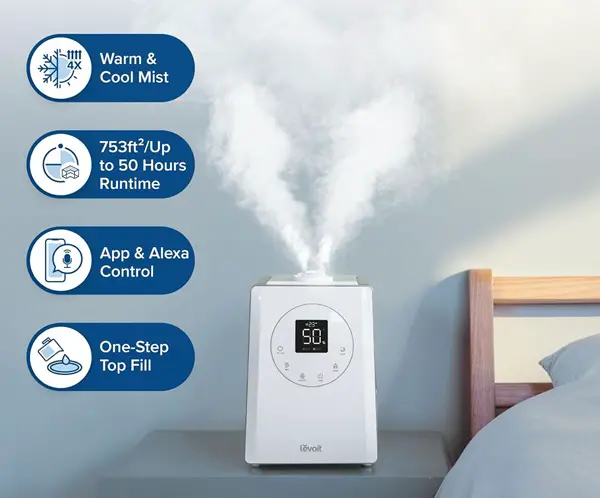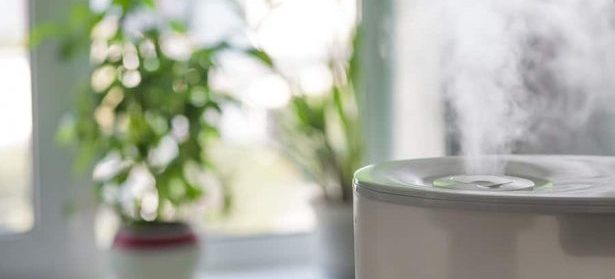
Among the many systems in our body, the respiratory and digestive systems are the most vulnerable to infections. Of these, the respiratory system tends to get affected more quickly and can sometimes lead to serious or even chronic conditions.
One such infection is pneumonia—or its milder form, walking pneumonia.
If you’re dealing with walking pneumonia, natural and at-home remedies can help manage symptoms, though they’re not a cure.
A humidifier, for example, can be especially helpful. By adding moisture to the air, it helps loosen thick mucus, ease congestion, and soothe a sore or irritated throat. Warm mist in particular can thin out sticky mucus, making it easier to cough up.
Just keep in mind: using a humidifier comes with a responsibility. It’s important to clean it regularly to prevent bacteria or mold from spreading.
Pair this with plenty of rest, hydration, and warm fluids, and you’ll give your body the comfort it needs while recovering.
How Does a Humidifier Help Pneumonia?
Walking pneumonia is a term doctors use for a lighter, less severe form of pneumonia. The good news is, it usually doesn’t hit you hard enough to keep you in bed all day or send you to the hospital.
Most people can still go to work, attend classes, or manage their usual routine—though they don’t feel 100%. Common signs include a stubborn cough that just won’t go away, low energy or fatigue, and sometimes a mild fever.
Think of it as your body’s way of telling you something’s not right, but not bad enough to completely stop you in your tracks.
Using a well-branded humidifier for pneumonia is often recommended for relieving the symptoms fast at home.
A humidifier helps by adding moisture to the air, which:
- Loosens mucus: Dry air can make mucus thicker and harder to clear. Moist air helps thin it out, making coughing more productive.
- Eases congestion: Breathing in humid air can reduce irritation in the nasal passages and chest, helping you feel less “blocked up.”
- Soothes throat and airways: Moisture relieves the dryness and scratchiness caused by constant coughing.
- Supports comfort during sleep: Keeping the air comfortably humid can reduce nighttime coughing and help you rest better, which is important for recovery.

Which Humidifier is Best to Use for Pneumonia?
For most pneumonia cases, a cool-mist humidifier is the safest and most effective option—especially if it’s ultrasonic or evaporative and well-maintained.
If you prefer warmth and safety isn’t a concern, a hybrid model like the Levoit LV600S gives you the flexibility along with smart control.
The user-friendly illuminated LCD panel in the machine shows you the current humidity level inside your room, which helps digitally program your desired humidity level.
| Feature | Recommended for Pneumonia |
|---|---|
| Cool Mist (Ultrasonic/Evaporative) | Safe, effective; needs diligent cleaning |
| Warm Mist (Vaporizer) | Soothing, self-cleaning; riskier for burns |
| Hybrid (Cool + Warm) | Flexible—best of both worlds |
| Smart Features (hygrostats, timers) | Ideal for precise humidity control |
Many people find the gentle steam comforting, especially during cold nights.
So, if you want, you can sleep with a steam vaporizer running in your room, and it may provide some relief if you’re suffering from pneumonia. It can help thin out secretions in the lungs.
However, there are some cautions. Because steam vaporizers use boiling water, they can pose a burn risk if tipped over or touched accidentally—something to be extra mindful of if children or pets are around. They also make the room warmer, which may feel uncomfortable if you already have a fever.
For people who need to cover a large bedroom or a living space, they might opt for a console or whole-room humidifier.
These models are designed with larger water tanks and higher mist output, making them ideal for maintaining consistent humidity levels across bigger areas without needing frequent refills.
Unlike compact tabletop units, whole house console humidifiers can run for longer hours and provide more even coverage, which is especially helpful for pneumonia patients who spend most of their time in one main room.

The Hidden Risks of Using a Humidifier with Pneumonia
Can a humidifier cause pneumonia, or can installing one worsen the infection?
Having a question like this in mind is obvious! After all, you do not want to make your parents, child, or spouse sicker. Instead, you are always concerned about lowering their suffering.
Installing a humidifier in the room of someone with pneumonia can provide significant relief rather than harm, as long as it is used and cleaned properly.
The only real risk comes from poor maintenance. If a humidifier isn’t cleaned regularly, it can become a breeding ground for bacteria and mold, which may worsen respiratory problems.
To keep your humidifier clean, you can use bleach or a vinegar solution to clean the parts and filters.
White vinegar is a natural, gentle cleaner that helps dissolve mineral deposits (the “white dust” left behind by hard water) and kills some germs.
A mild bleach solution (usually 1 teaspoon of bleach in 1 liter of water) is more powerful for disinfecting. It kills bacteria, mold, and other microbes that could otherwise spread through the mist.
Remember, infections and illnesses are mainly caused due to bacteria, fungi, white dust, mold, and germs growing in your household.
It’s not your home appliances that can cause harm. So, keeping your humidifier clean and in good running condition is key to good health and faster infection recovery.

Other Treatment Options and Home Remedies for Walking Pneumonia
Pneumonia is most often caused by droplet infection, where germs spread through the air when an infected person coughs, sneezes, or even breathes.
People with weaker immune systems are more likely to get infected, especially in crowded places like schools, offices, hospitals, or even at home if the germs are present in the air.
The main symptom of pneumonia is a persistent cough with phlegm (often green, rusty, or blood-streaked).
Other common signs include chills with teeth chattering, constant fever, fatigue, rapid breathing with palpitations, chest pain, sore throat from coughing, and sometimes nausea or vomiting due to the infection.
Generally, in the case of walking pneumonia (due to any cause), the patient should:
- Take plenty of rest
- Drink lots of water and other liquid items
- Try to avoid smoking, alcohol, tobacco, tea & coffee, etc.
In addition to the above, there are a few home remedies that can help in getting relief.
- Try to take a warm or hot bath to increase peripheral circulation, which may naturally suppress your pneumonia symptoms.
- You may also take facial steam added with a few drops of eucalyptus oil to get relief from cough and chest congestion caused due to pneumonia. It also acts as a good expectorant.
- Performing deep breathing exercises after a hot shower or facial steam also helps to strengthen the chest muscles effectively and can be tried in addition.
- Taking a massage with heavy percussion movements over the neck, shoulders, and back helps to relieve chest congestion, loosen the mucus accumulation in the lungs and windpipe, and help to expand the chest freely.
Can Essential Oils Support Pneumonia Treatment? What You Need to Know
Essential oils are sometimes used as a complementary remedy to help with breathing difficulties, but they should never replace medical treatment for pneumonia.
Some of these oils are also potent and can irritate the lungs if overused, especially for people with asthma or sensitive airways.
However, there are oils like thyme, tea tree, clove, rosewood, and peppermint that are believed to have antibacterial, antiviral, or soothing properties that may provide temporary relief. When used safely, they may help ease congestion, promote relaxation, and support overall comfort.
The safest way to use essential oils is in an oil diffuser that disperses a fine mist into the air.
Some humidifiers also have special compartments designed for essential oils, but not all devices are built for this purpose—adding oils directly to the water tank of a standard humidifier can damage the unit and promote mold growth. Always check your humidifier’s manual before use.
When a continuous cough keeps you awake at night, it’s best to consult your doctor for a suitable cough suppressant to get faster relief. Patients with chronic pneumonia should strictly follow the prescribed medication schedule for proper recovery.
For bacterial pneumonia, antibiotics are the most effective treatment and are usually prescribed for at least a week.
In contrast, for viral pneumonia, antibiotics alone don’t work (though they may help prevent complications). Instead, proper rest, hydration, and a healthy diet play a major role in recovery.
The recovery time from pneumonia can vary greatly—from a few weeks to as long as six months—depending on your overall health and the severity of the infection.
Symptoms like fever often improve within 3–4 days of starting treatment, but cough, chest pain, and breathlessness may take 2–3 months to resolve in severe cases. Fatigue is often the last symptom to fade and may linger for several additional weeks.
The Conclusion
Humidifiers can be a helpful home remedy for easing the discomfort of walking pneumonia. By adding moisture to the air, they loosen mucus, ease congestion, and soothe irritated airways, making it a little easier to breathe and rest.
But it’s important to remember that a humidifier is not a cure. Walking pneumonia, even though considered mild, can linger or worsen without proper care.
That’s why rest, hydration, and following your doctor’s advice are essential. If your cough, fever, or fatigue lasts longer than expected, don’t ignore it—see a healthcare professional to avoid complications and recover faster.
Meen Smith is a nurse by profession who loves writing online, spending time with her family and caring for the elderly. She has already worked as an associate editor on various moms, babies, home appliances, kitchen, and healthy living blogs. In her spare time, she also enjoys drawing, reading/writing kindle eBooks and improving her skills a bit.
